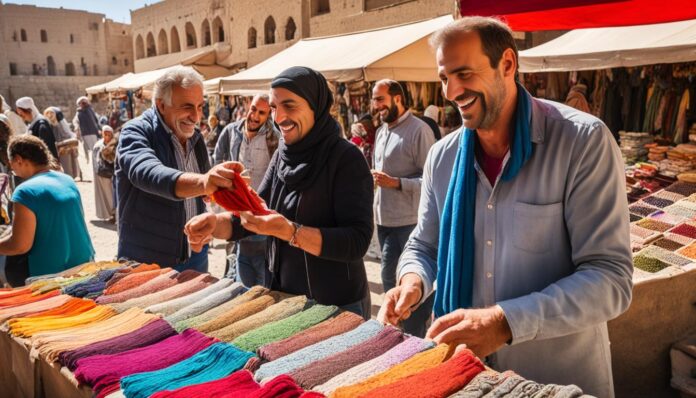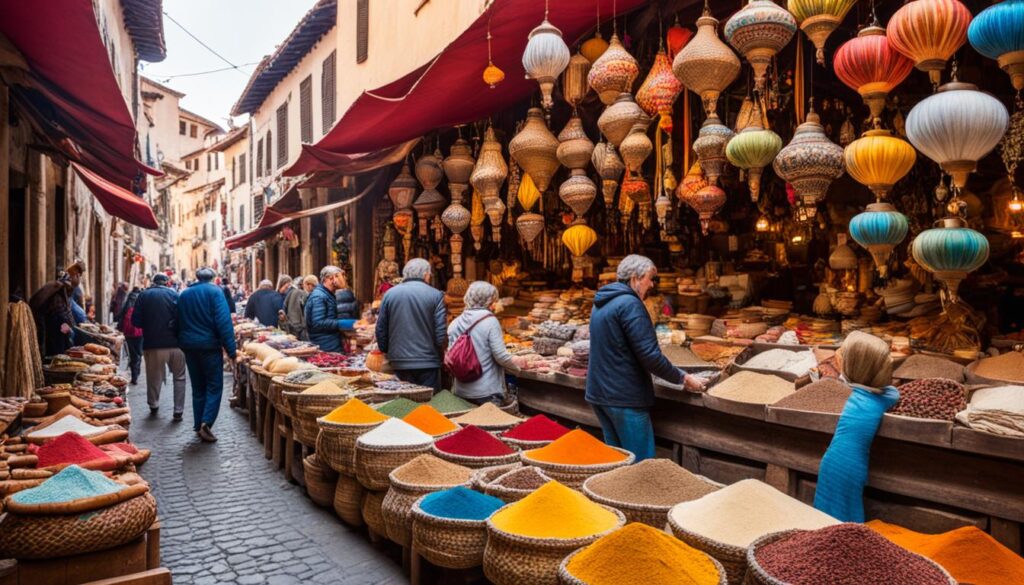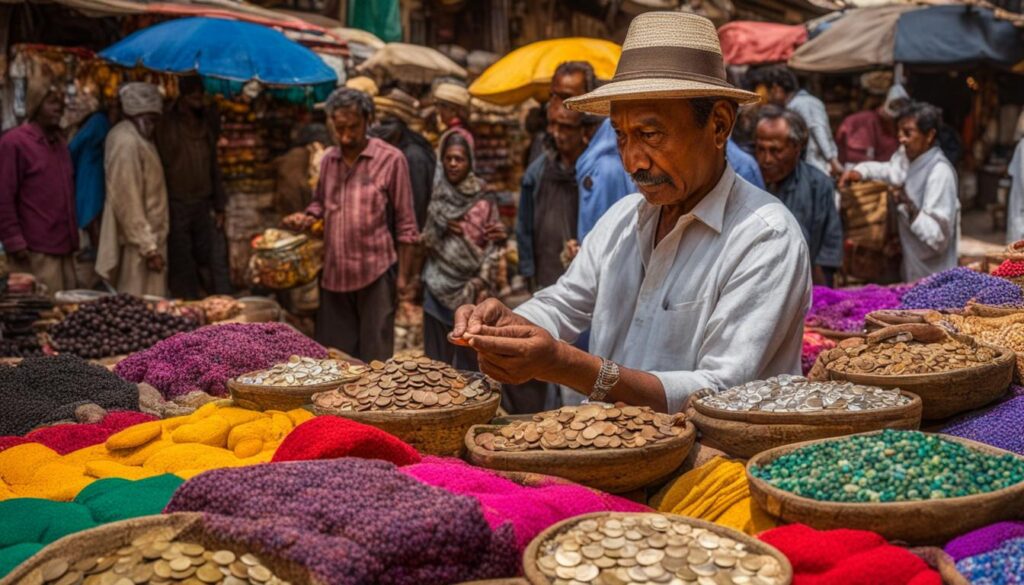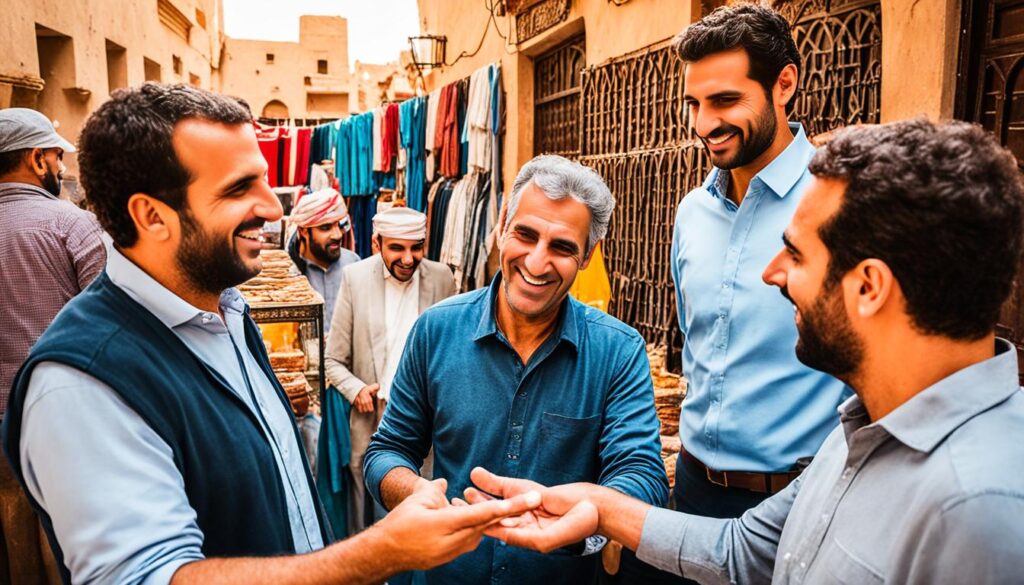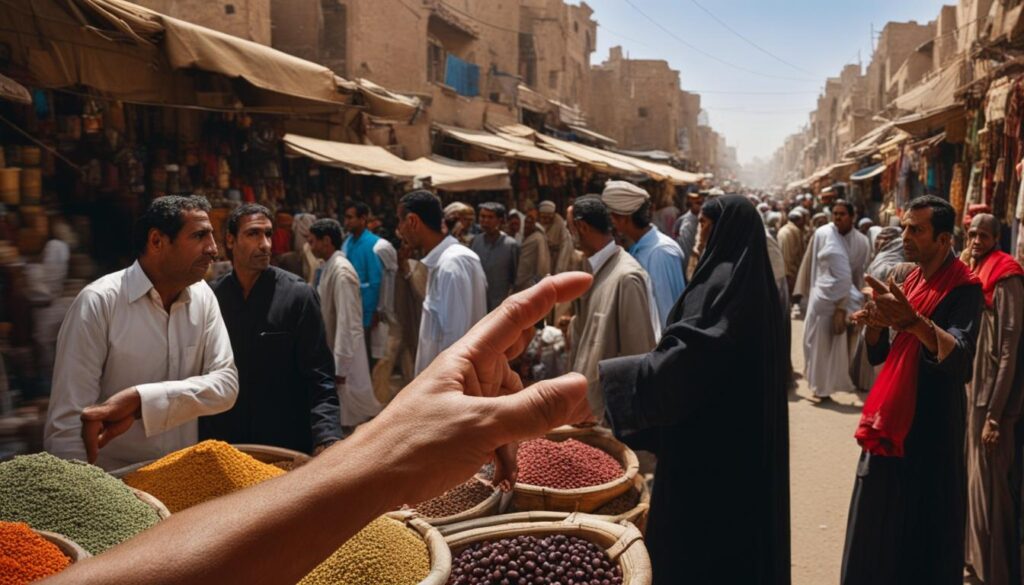Are you planning to visit Luxor’s enchanting souks and wondering what are some tips for bargaining? Look no further. With our expert bargaining tips, you’ll be able to master the art of haggling and get the best deals on unique souvenirs, spices, and textiles.
Ensure you have an unforgettable shopping experience in Luxor’s souks with our guidance. But first, let’s delve into what makes the souks in Luxor a one-of-a-kind experience, with the culture and customs that shape the bargaining process.
Whether you’re a seasoned traveler or a first-timer to this mystical land, our bargaining tips are designed to equip you with the skills you need to negotiate confidently in Luxor’s souks. Reach greater bargaining power by researching prices, building a rapport with the merchants, and using strategic techniques such as counter offers and non-verbal communication.
So, what are some tips for bargaining in Luxor’s souks? Read on for the ultimate guide to negotiating like a pro.
Understanding the Souk Culture in Luxor
Before mastering the art of bargaining, it’s essential to have a deeper understanding of the unique souk culture in Luxor. Exploring the customs, traditions, and bargaining etiquette that are commonly observed in these markets will give you a better perspective and help you navigate the bargaining process effectively.
Here are some important aspects of the Luxor souk culture you should keep in mind:
- Souk Shopping: Luxor’s souks are known for their diverse selection of products ranging from textiles, spices, jewelry, and souvenirs. These markets are a one-stop-shop for your vacation shopping in Egypt.
- Bargaining Etiquette: Bargaining is expected in Luxor’s souks, and it’s essential to negotiate politely and respectfully. Aggressive bargaining is frowned upon and can harm the merchant-client relationship.
- Cultural Norms: In Islamic culture, modesty is highly valued, and it’s essential to dress appropriately to respect local customs and avoid unwanted attention. It’s also customary to greet the merchant and make small talk before starting a transaction.
By having a better understanding of the souk culture in Luxor, you’ll be able to engage in the bargaining process with more confidence, respect, and cultural sensitivity.
Common Prices in Luxor Souks for Tourists
| Product Category | Common Price Range (USD) |
|---|---|
| Textiles | 7-25 |
| Spices | 3-15 |
| Jewelry | 20-150 |
| Souvenirs | 1-10 |
It’s crucial to conduct prior research and familiarize yourself with the local prices for different products in Luxor’s souks. The above table depicts some common price ranges for tourists to use as a starting point in their price research.
Researching Prices and Local Customs
Before you start bargain hunting at Luxor’s souks, it’s important to conduct thorough research on prices and familiarize yourself with the local customs. By doing so, you’ll be able to negotiate with more confidence and avoid being overcharged.
Price Research
Start by researching the average prices for the items you’re interested in purchasing. You can check online marketplaces or consult travel guides for price ranges. It’s also a good idea to ask locals or your hotel front desk for advice on fair prices.
Keep in mind that bargaining is expected in Luxor’s souks, and the first price merchants offer is often inflated. Use your price research as a benchmark and aim to negotiate between 30-50% off the original asking price.
Local Customs
Familiarize yourself with Luxor’s souk culture and bargaining etiquette to avoid any cultural misunderstandings. Here are some common customs to keep in mind:
| Custom | Description |
|---|---|
| Haggling | Haggling is expected. Merchants will often start with a high price, and it’s up to you to negotiate a fair price. |
| Respectful Communication | Ensure you show respect and use polite language during negotiations. It’s common to exchange pleasantries before delving into bargaining. |
| Walking Away | If a merchant isn’t budging on their price, you can try walking away. Often, they will call you back and compromise on the price. |
| Product Inspection | It’s common to inspect the item you’re interested in purchasing for any defects or damage before settling on a price. |
By researching prices and understanding the local customs, you’ll be well-equipped to navigate Luxor’s souks with confidence and negotiate successfully. Remember to stay respectful and polite during negotiations, and don’t be afraid to walk away if the price isn’t right.
Setting a Realistic Budget
Before heading to Luxor’s souks, it’s crucial to set a realistic budget to ensure you stay within your financial limits. By doing so, you’ll negotiate with confidence and avoid overspending.
To determine your shopping budget, consider factors such as transportation costs, lodging expenses, and daily expenditures for food and other activities. After this calculation, you can then allocate a reasonable amount for your shopping experience in the souks.
When setting your budget, keep in mind that bargaining is a standard practice in Luxor’s markets. As such, it’s essential to factor in a bargaining budget – an amount separated from your shopping budget – that gives you room to negotiate without exceeding your overall budget.
Remember, the key is to be realistic with your budget without limiting your ability to explore the unique shopping opportunities that the souks offer.
In the table below, see an example of how you can set up a reasonable shopping budget for your souk experience in Luxor.
| Expense Type | Estimated Cost |
|---|---|
| Hotel for 5 Nights | $400 |
| Flight | $500 |
| Food and Activities for 5 Days | $150 |
| Bargaining Budget (20% of Shopping Budget) | $100 |
| Total Estimated Cost | $1,150 |
Tip:
Stick to your budget, even when shopping for tempting souvenirs in the souks. Remember that you’re in charge of your finances and its best to avoid overspending.
Building Rapport with the Merchants
When it comes to successful bargaining in Luxor’s souks, building a good rapport with the merchants can go a long way. By establishing a positive relationship and demonstrating your interest in their products, you can increase your bargaining power and negotiate better deals.
One effective way to build rapport is to start with small talk. Ask the merchant about their products, their family, or even the weather. This can help create a friendly and relaxed atmosphere and show that you are interested in more than just the price of the product.
Another important aspect of building trust with the merchants is showing respect for their culture and traditions. Making an effort to understand their way of life and customs can be highly appreciated and help you earn their respect.
Remember to always be polite, patient, and respectful during negotiations, even if you don’t reach an agreement. Leaving a positive impression can help establish long-term relationships and make future transactions smoother.
By following these tips and building a good rapport with the merchants, you can enhance your bargaining power and have a more fulfilling shopping experience in Luxor’s souks.
Starting with a Counter Offer
When starting negotiations in Luxor’s souks, it’s important to begin with a counter offer. This puts you in a stronger position to influence the negotiation towards your advantage. Here are some tips:
- Research the average price – Do some background research to determine the average price for the item you want to buy. This will give you a starting point for your counter offer.
- Determine your initial offer – Based on your research, determine what you feel is a fair price for the item. Your first offer should be lower than this amount.
- Be confident and assertive – When making your initial offer, communicate it with confidence and assertiveness. This shows that you are serious about bargaining and sets the tone for the negotiation.
- Respectfully handle counter offers – Be prepared for the merchant to counter your offer. This is a normal part of the negotiation process. If the counter offer is still too high, reaffirm your initial offer and continue the negotiation.
- Know when to walk away – If the merchant refuses to meet your price, or if you feel the negotiation is not going as planned, know when to gracefully walk away. This can sometimes prompt the merchant to make a last-minute offer.
By starting with a counter offer, you’ll demonstrate that you are a savvy shopper who is well-informed about the pricing and willing to negotiate. This can lead to a more successful bargaining experience, resulting in great purchases at lower prices.
Demonstrating Interest and Walking Away
To be a savvy bargainer, the techniques you use can make all the difference. Demonstrating interest in a product and being prepared to walk away can be powerful bargaining strategies. When you show interest in a product, the merchant knows that you are genuinely interested in buying it. Walking away, on the other hand, indicates that you are not willing to overpay and that you have other options. Both techniques can help you negotiate better prices, but timing is key.
When you have found something you like, show interest by asking questions about the product and expressing admiration. Smile and engage in light conversation so that the merchant knows that you are serious about buying it. Don’t reveal your budget or how much you’re willing to pay, but instead ask for the price. If the asking price is too high, you can make a lower counteroffer and negotiate from there.
If the price negotiation isn’t going your way, you can use the walking away technique: simply start to leave. The merchant may try to stop you and make a new offer, closer to your price range. However, if they don’t come after you, then it may be time to consider the possibility that you’re asking for too much or the merchant is unwilling to negotiate. In that case, it’s best to walk away and look for the product elsewhere.
By using these techniques, you can negotiate the best deal possible and feel confident in your purchase decision.
Using Non-Verbal Communication
When it comes to bargaining in the souks of Luxor, mastering non-verbal communication is an essential part of the process. Body language, eye contact, and other non-verbal cues can convey your interest, assertiveness, and willingness to negotiate effectively.
Body language can be particularly powerful in expressing interest non-verbally. For example, leaning forward slightly or raising your eyebrows can indicate enthusiasm for a product. Maintaining eye contact can demonstrate confidence and assertiveness.
On the other hand, folding your arms or fidgeting can suggest disinterest or reluctance to negotiate. Avoid negative body language and maintain an open, friendly posture throughout the bargaining process.
It’s also important to pay attention to the non-verbal cues of the merchant. Watch for signs of willingness to negotiate, such as nodding or smiling, and adjust your bargaining strategy accordingly.
Remember, non-verbal communication can communicate just as much as spoken words, so don’t underestimate its power during bargaining!
Closing the Deal and Being Polite
After an engaging negotiation in Luxor’s souks, it’s crucial to finalize the deal politely and respectfully. The way you handle the deal’s closure can have an impact on whether the merchant will remember you fondly or not. Here are some tips to guide you:
Express Appreciation:
Show gratitude towards the merchant’s time and effort spent on the transaction. Sincerely thank them for their cooperation, and perhaps mention how much you enjoyed your interaction. A genuine expression of gratitude can leave a lasting impression and may encourage the merchant to offer additional perks or even invite you to their shop again.
Pay the Agreed Price:
Once the final price is agreed upon, make sure to pay the amount promptly and kindly. Reiterate the price, the currency, and the number of items you are purchasing. Count the money correctly, and don’t forget to let the merchant know that this is the final amount. Although bargaining is a part of the souk culture, it’s important not to renege on the price agreed upon.
Take the Merchant’s Contact Details:
If you’re pleased with the merchant’s product, attitude, or service, it’s worthwhile to ask for their contact details. You may want to return in the future for more souk purchases, and staying in touch with a trustworthy merchant can be helpful. Additionally, they may offer a discount or special deal for your next visit.
“Politeness goes a long way. Once, a merchant remembered me and offered me a good deal for remembering him as well.”
The quotation above highlights the importance of being polite and respectful. Even a small gesture, such as saying thank you, can make a significant difference in how you’re perceived as a customer.
Remember, closing a souk deal in Luxor requires a blend of assertiveness, tactfulness, and courteousness. The final impression you leave on the merchant is essential, as it can impact their business and your chances of returning for more souk purchases.
Conclusion
Now, armed with these expert bargaining tips, you can confidently negotiate at the souks in Luxor. Remember to understand the local culture, set a realistic budget, build rapport, and use strategic techniques such as counter offers, non-verbal communication, and walking away when necessary. By mastering the art of bargaining, you’ll transform your shopping experience, save money, and bring home unique treasures from Luxor’s vibrant souks.
Don’t be afraid to test out these tips and experiment with your own style. With practice, you will become a successful haggler in no time. So get out there and conquer the Luxor souks with your newfound bargaining skills!
Thank you for reading our guide on bargaining tips for Luxor souks. We hope you found these tips helpful and that they will lead to successful haggling and enjoyable shopping experiences in Luxor.




























